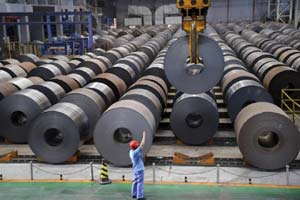The 2.5-percentage-point increase in import duty on a slew of steel items announced by the government on Wednesday would not have a restraining effect on cheap imports from Chinese producers, which accounted for more than a third of India’s steel imports in the first quarter of this fiscal, industry executives said, reports fe Bureau in New Delhi. Among the other major exporters of steel, those from South Korea and Japan can continue to use the FTA window to export to India with minimal or no taxes.
So even in the case of these countries, the hike in import duty won’t serve the purpose of giving relief to domestic primary producers like Tata Steel, Essar, JSW and SAIL that have been hit by a demand crunch.
At the current juncture, when the global steel industry is witnessing a glut, only protective measures like safeguard/anti-dumping duties could reduce imports, the industry believes.
The differential between China’s export prices of physical varieties of the alloy to India and the corresponding domestic prices is very high. It is about 25%, for instance, in the case of hot-rolled coil (HRC), with the CIF price of Chinese HRC ruling at $330 a tonne compared with the domestic price of $440 per tonne.
Using the legroom provided by the almost 4% devaluation of the yuan in the last two days, China’s steelmakers on Wednesday itself lowered export prices of steel products like rebar for construction use by $5-10 a tonne, according to agency reports. Taking the July price, an increase of 2.5 percentage points in import duty translates to an increase in landed price of Chinese steel only by $8 or thereabouts, which is only a fraction of the difference between domestic and imported steel.
The duty hike on iron and steel applies to ingots, semi-finished products, bars, rods and wires of iron or non-alloy steel. Besides iron and steel, basic customs duty on base metals such as copper, nickel and aluminium were also raised by 2.5% on Wednesday, and this could benefit domestic producers of these metals.
“While the duty increase on steel is a welcome step, this alone probably may not be sufficient to curtail the flood of cheap imports. We look forward to additional trade remedial measures to curtail the heavy surge in imports,” said Jayant Acharya, director, marketing, JSW Steel.
During 2014-15, India imported 9.3 million tonnes (mt) of finished steel, up 71% from a year ago. Even on that high base, imports have since continued to surge steeply. In April-June quarter of the current fiscal, imports at 2.5 mt were up 52% from the year-ago period, with China, Russia, South Korea and Japan being the major exporters to India.
The government in June had hiked customs duty on long products to 7.5% from 5.5% and on flat products to 10% from 7.5%. On Wednesday, these were hiked further to 10% and 12.5%, respectively.
Indian steel companies had demand imposition of anti-dumping and safeguard duties on imports from China and elsewhere. Russia and Indonesia have recently become aggressive exporters to India, making the situation more difficult for Indian companies. Given the glut in the global market, most of the major steel producing countries have raised trade remedial measures to prevent dumping of steel.
Domestic steelmakers had sought a safeguard duty on HRC, sheets and plates to avoid “injury” from cheaper imports. The proposal is now before the director general of safeguards in the finance ministry.
In June, India had imposed anti-dumping duty of up to $316 per tonne on imports of certain steel products from three countries, including China, to protect domestic producers.
However, downstream secondary steel producers are not happy with the government providing tariff protection to major producers. They say there is no dumping of cheap steel by external producers. According to SC Mathur, executive director of the Cold Rolled Steel Manufacturers Association of India, the surge in cheap imported steel is on account of a 60% fall in global iron ore price and a 35% decline in the price of other raw materials such as coking coal, which has been passed on to the consuming industry. If tariff protection is given to a vital industry like steel, it would adversely affect the manufacturing sector and could result in a surge in cheap import of manufactured items, said Mathur.


